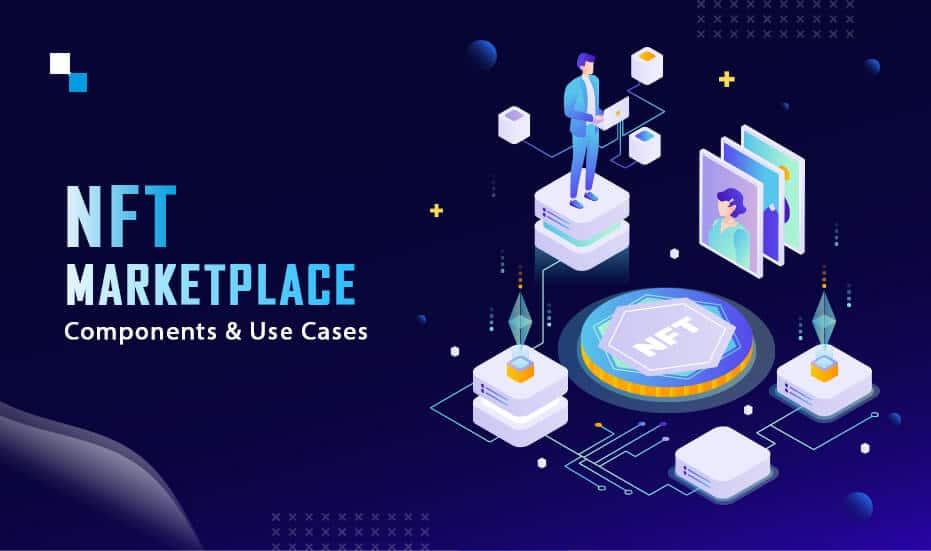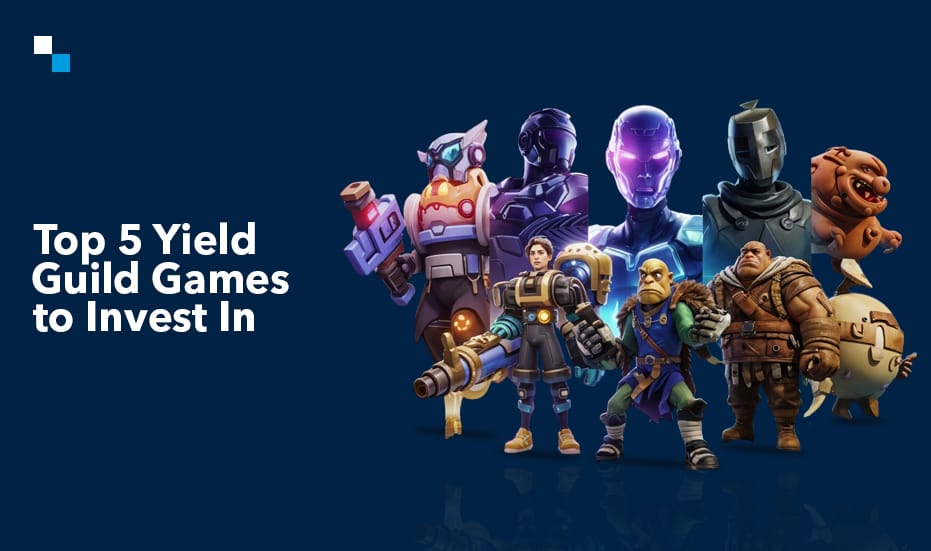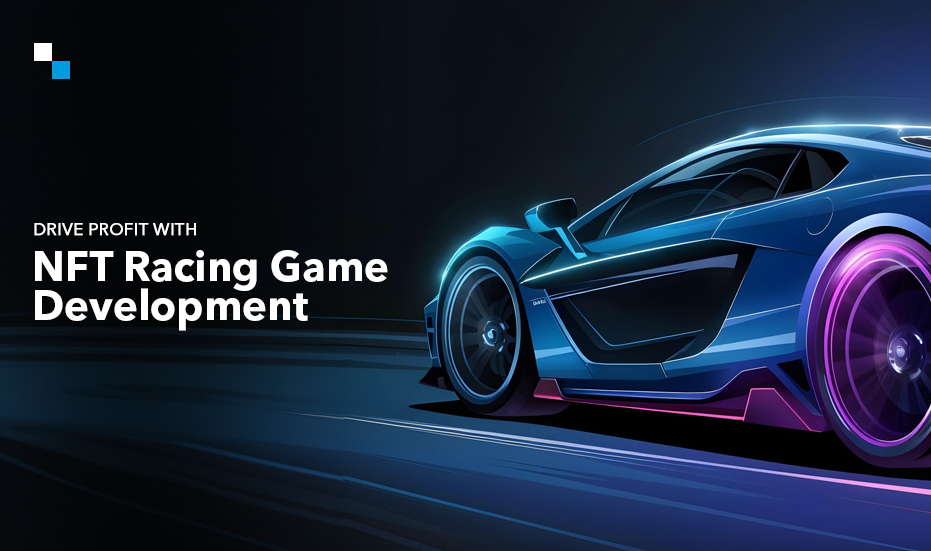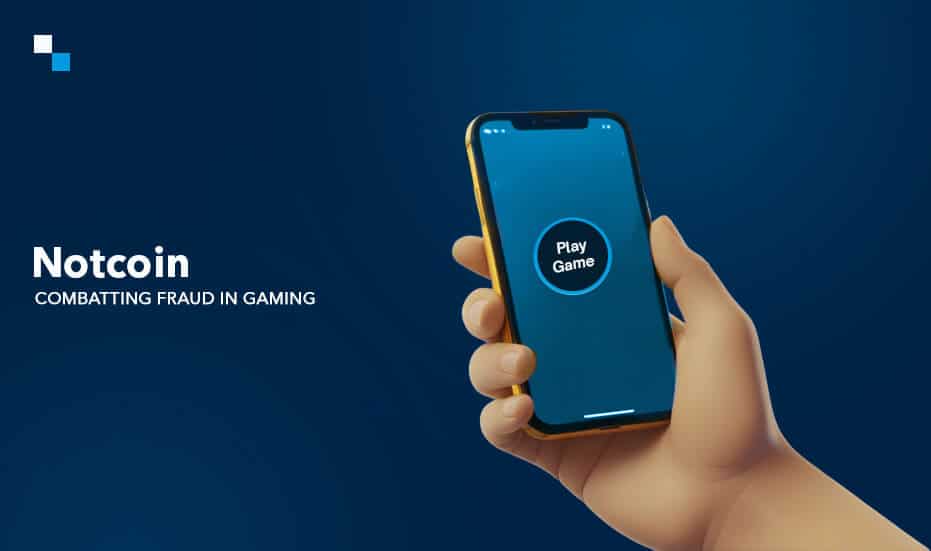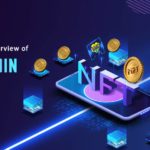
A Brief Overview of Bitcoin NFTs
May 8, 2023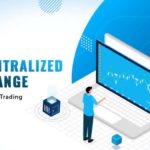
Centralized Exchanges Vs. Decentralized Exchange Software: What’s Best For You?
May 8, 2023Since 2021, the concept of non-fungible tokens (NFTs) is grabbing headlines, and transactions in NFTs experienced a major upsurge while proving its true potential across diverse industry verticals across the globe.
Major global unicorns that have dipped their toes in the non-fungible token development space include Adidas, Nike, Gucci, Tiffany, Time Magazine, Budweiser, Lacoste, and a lot more.
Not only this, as per a recent report, the global NFT market size is projected to reach US$ 7.63 billion by 2028, from US$ 1.59 billion in 2021, at a CAGR of 22.05% during 2022-2028.
Opening doors to countless business opportunities, investing in NFT token development can provide modern businesses with a way to diversify their asset portfolio beyond traditional investments like stocks and bonds.
In this blog, we take a deep dive into numerous aspects of NFT.
Without any further ado, let’s get you started!
Table of Contents
What are NFTs?

NFTs, or non-fungible tokens, are a type of digital asset that is stored on a blockchain, a decentralized and distributed digital ledger. They are unique and cannot be replaced or exchanged for another token of the same value, unlike fungible tokens (such as Bitcoin) which are interchangeable.
NFT token development services provide unique and verifiable proof of ownership for digital assets, which can be valuable for businesses that create or sell digital content. NFTs are built on blockchain technology, which provides a decentralized and secure platform for buying, selling, and trading digital assets.
The Hype of NFT Token Development
NFTs provide a unique way for businesses to showcase their brand and products to a new and engaged audience.
Overall, the growing popularity and adoption of NFTs by businesses reflect a shift towards a more digital and decentralized economy, where ownership and value are increasingly based on digital assets and experiences.
Let’s take a glance at the search interest of consumers in the search term “NFT” in 13 different countries and territories worldwide from December 2021 to November 2022:
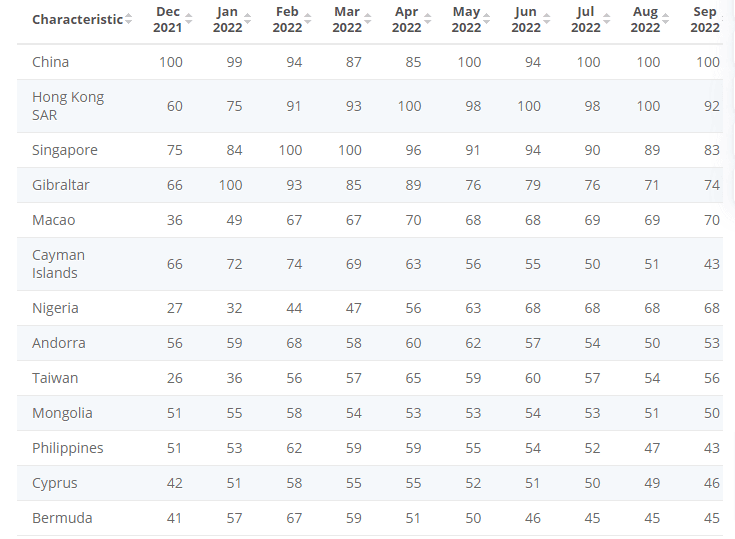
There are several factors that have contributed to the growing demand for NFTs:
- Scarcity and Exclusivity
NFTs are often created in limited quantities or as one-of-a-kind items, making them inherently scarce and exclusive. This scarcity can drive up demand and the perceived value of NFTs. - Digital Ownership and Provenance
NFTs provide a unique and verifiable proof of ownership for digital assets, which has become increasingly important as more content and assets are created and shared digitally. NFTs can also provide a clear chain of ownership and provenance, which can be valuable for collectors. - Unique and Novel Use Cases
NFT software development is being utilized in a variety of unique and novel ways, such as for digital art, music, and gaming. These NFT use cases 2023 have captured the attention of a broad audience and have helped to drive demand for NFTs. - Cryptocurrency and Blockchain Adoption
NFTs are built on blockchain technology, which has become more widely adopted in recent years. The growing popularity of cryptocurrency and blockchain technology has also increased awareness and the adoption of NFTs. - Investment potential
As some NFTs have sold for millions of dollars, many investors are seeing the potential for significant returns on their investments innon-fungible token development. This has driven demand from both individual and institutional investors.
What is NFT Marketplace?
An NFT marketplace is an online platform that facilitates the buying, selling, and trading of Non-Fungible Tokens (NFTs). The marketplace typically integrates with one or more blockchain platforms, such as Ethereum, to facilitate the buying and selling of NFTs.
NFT marketplace development provides a digital space for artists, collectors, investors, and enthusiasts to exchange unique digital assets verified through blockchain technology.
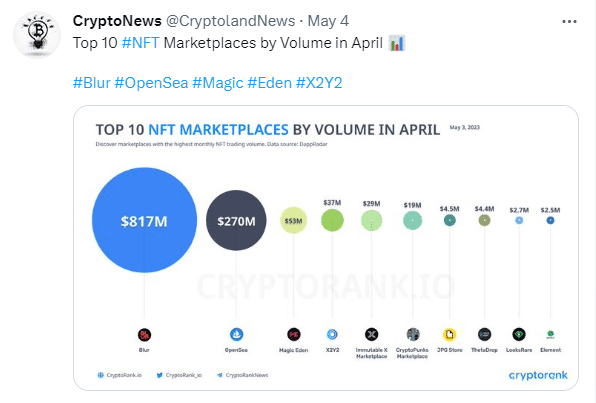
NFT marketplaces typically offer a range of NFTs, such as digital art, music, videos, gaming items, and other collectibles. Non-fungible token marketplaces use blockchain technology to verify the ownership, authenticity, and provenance of NFTs, ensuring a secure and transparent marketplace for buyers and sellers.
These marketplaces can also provide tools and resources for creators to mint and sell their own NFTs.
There are several reasons why NFT marketplaces are important:
- Liquidity
NFT marketplace development services provide liquidity for NFTs, meaning that sellers can easily find buyers and buyers can easily find NFTs to purchase. This can help to establish a fair market value for NFTs and make them more accessible to a broader audience. - Security
NFT marketplaces provide a secure platform for buying, selling, and trading NFTs. The use of blockchain technology provides a decentralized and transparent system that can prevent fraud and ensure that transactions are secure. - Discoverability
NFT marketplaces allow for the discovery of new and unique NFTs that might not be easily found elsewhere. This can help to connect buyers with sellers and promote the growth of the NFT ecosystem.

- Standardization
NFT marketplaces can help to establish standards for NFTs, such as metadata and provenance information, that can help to establish authenticity and value for NFTs. - Monetization
NFT marketplaces can provide a revenue stream for the platform owners and creators of NFTs. The marketplace can take a commission on each sale, and creators can earn money by selling their NFTs on the platform.
Primary Components of NFT Marketplace Development Services
From a technical perspective, an NFT marketplace typically includes the following components:
- Smart Contracts: These are self-executing contracts with the terms of the agreement between buyer and seller being directly written into lines of code. They are stored on the blockchain and are used to facilitate the buying and selling of NFTs.
- Front-end Interface: The robust user interface that allows users to browse, search and purchase NFTs. The front-end interface communicates with smart contracts to facilitate transactions.
- Blockchain Integration: The marketplace integrates with one or more blockchain platforms, such as Ethereum, to facilitate the buying and selling of NFTs. This includes connecting to the blockchain network, creating and managing wallets, and interacting with smart contracts.
- Token Minting: Some NFT marketplaces allow creators to mint and manage their own NFTs. The NFT marketplace provides a user interface and smart contract to mint NFTs.
- Digital Content Delivery: NFT marketplace development often includes the ability to deliver digital content such as images, videos, and audio files associated with the NFTs. This is done by storing the digital content on a decentralized storage network, such as IPFS (InterPlanetary File System), and linking it to the NFT on the blockchain.
- Reputation and Trust System: NFT marketplaces usually have a reputation and trust system, which is usually implemented via smart contract, this smart contract stores the user’s reputation information and allows the buyer and seller to see it.
- Analytics and Dashboard: NFT marketplaces usually provide analytics and a dashboard, which help the creators to know how well their NFTs are selling, which NFTs are more popular, etc. This is usually implemented by storing the data on a decentralized database, such as BigchainDB, and using a back-end server to aggregate and analyze the data.
Common Types of NFT Marketplaces
NFT marketplaces can be categorized based on their underlying technology and governance models.
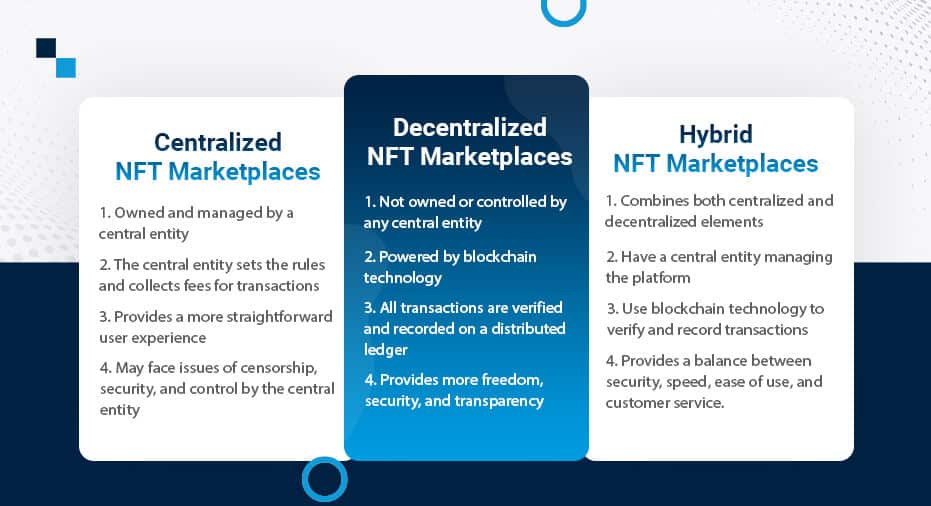
Let’s get into the details!
Centralized NFT Marketplaces
These are NFT marketplaces that are owned and operated by a single entity, which could be a company, organization, or individual. In a centralized NFT marketplace, the platform’s owners have full control over the platform, including the fees charged, asset curation, and dispute resolution.
Common examples of centralized NFT marketplaces include:
- Nifty Gateway
- SuperRare
- Foundation
Decentralized NFT Marketplaces
Decentralized NFT marketplaces operate on blockchain technology, which means that they are distributed across a network of computers rather than being owned and operated by a single entity. In a decentralized NFT marketplace, users can create and trade NFTs without the need for a central authority. These platforms offer greater transparency, censorship resistance, and user control.
Common examples of decentralized NFT marketplaces include:
- OpenSea
- Rarible
- KnownOrigin
Hybrid NFT Marketplaces
Hybrid NFT marketplaces combine elements of both centralized and decentralized marketplaces. These platforms may use a blockchain-based infrastructure to handle the creation and trade of NFTs but may also have a centralized element for user experience, marketing, and asset curation.
Common examples of hybrid NFT marketplaces includes.
- Crypto.com NFT
- MakersPlace
Ultimately, the choice between a centralized, decentralized, or hybrid NFT marketplace will depend on the user’s priorities and preferences. Some may prefer the security and transparency of a decentralized marketplace, while others may value the ease of use and customer service of a centralized marketplace. A hybrid marketplace may provide a balance between the two.

Best NFT Use Cases for 2023 & Beyond
With the concept of the NFT marketplace spreading like wildfire, there are numerous potential NFT business applications that can assist modern businesses to cater to evolving customer needs.
Here are the most appealing use cases for NFT that will help you get a better insight into how companies are using NFT.
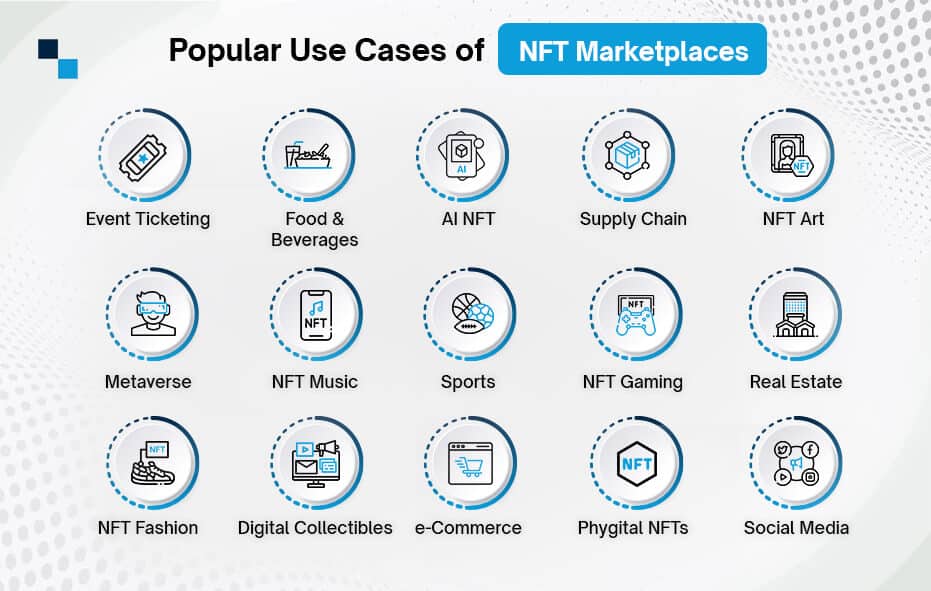
Event Ticketing
One potential use case for NFT is in event ticketing systems. By using NFTs, event organizers can improve the authenticity of tickets, as each NFT is unique and contains information about its ownership and history, making it difficult to counterfeit or duplicate.
Additionally, NFTs can be created in large quantities and easily distributed, making them suitable for events with large audiences. Moreover, the ability to resell NFTs on secondary markets provides event organizers with the opportunity to generate additional revenue. There are numerous other benefits of streamlining event ticketing operations while you build an NFT marketplace.
Major reasons to invest in the NFT ticketing system:
- NFTs can be created in large quantities and easily distributed, making them suitable for events with large audiences.
- Each NFT is unique and contains information about its ownership and history, making it difficult to counterfeit or duplicate.
- NFTs can be resold on secondary markets, allowing event organizers to potentially benefit from the increased demand and scarcity of certain events or tickets.
- NFTs can be customized with unique designs or features, providing a layer of exclusivity and personalization for ticket holders.
Click here to explore more about NFT ticketing.
Food & Beverages
The use of NFT marketplace services in the F&B industry has the potential to improve transparency, efficiency, and customer engagement while enhancing the authenticity and traceability of products. Overall, NFTs have the potential to enhance the industry’s transparency, efficiency, and customer engagement.
- NFTs can be used to create unique and interactive experiences for customers, such as providing access to exclusive content, rewards, and promotions. This can help build customer loyalty and increase engagement.
- NFTs can be used to verify the authenticity of food and beverage products, particularly for high-value or luxury items, helping to prevent counterfeiting and fraud.
- By digitizing and automating certain aspects of the supply chain using NFTs, the food and beverage industry can reduce costs, increase efficiency, and streamline operations.
AI NFT
Investing in a professional NFT marketplace company holds several benefits for the field of Artificial Intelligence (AI). AI NFTs can be used to increase data privacy and security by securely managing and protecting sensitive data used in AI training and development.
NFTs can improve data transparency and auditability by tracking the origin and ownership of data used in AI. Furthermore, NFTs can be used to establish intellectual property rights, create new revenue streams, and monetize AI models and algorithms. The use of NFTs in AI has the potential to improve innovation and progress in the field.
- NFTs can be used to securely manage and protect sensitive data used in AI training and development, ensuring that only authorized parties have access to the data.
- NFTs can be used to track and verify the origin and ownership of data used in AI, improving transparency and auditability.
- NFTs can be used to establish ownership and intellectual property rights for AI models and algorithms, allowing creators to protect and monetize their work.
- NFT token development services can be used to create new revenue streams for AI creators and developers, such as by selling access to AI models or training data.
Supply Chain
NFTs can be used to track and verify the movement of products throughout the supply chain, making it easier to identify issues and improve overall performance. NFTs can be used to create unique digital identities for each product, allowing for real-time tracking and verification of authenticity.
This can help reduce the risk of fraud, counterfeiting, and supply chain disruptions while improving efficiency and reducing costs. NFTs in the supply chain can be used to automate certain aspects of supply chain management, such as inventory management and order fulfillment.
- NFTs can be used to create unique digital identities for each product, allowing for real-time tracking and verification of authenticity throughout the supply chain. This can improve transparency, traceability, and accountability, reducing the risk of fraud, counterfeiting and supply chain disruptions.
- By automating certain aspects of supply chain management using NFTs, such as inventory management and order fulfillment, the supply chain industry can reduce costs and increase efficiency. This can help businesses meet demand more quickly and efficiently while reducing errors and delays.
- NFTs provide a secure and tamper-proof way to track the movement of products throughout the supply chain, reducing the risk of theft, damage, or loss. Additionally, NFTs can be used to securely store sensitive data, such as payment and financial information, ensuring that only authorized parties have access to the data.
NFT Art
The market cap of Art Blocks NFT projects available on the Ethereum blockchain and listed on OpenSea was worth around 848 million U.S. dollars.
Non fungible token development in the art industry has been a major topic of discussion lately. NFTs have the potential to transform the way art is bought, sold, and collected by providing a secure and transparent way to verify ownership and authenticity.
NFTs can be used to create unique digital identities for each piece of art, allowing for real-time tracking and verification of ownership, provenance, and sales history. This can help reduce the risk of fraud and counterfeiting while improving transparency and accountability.

These platforms focus on creating and selling unique digital art pieces as NFTs. Common examples include Foundation and KnownOrigin.
- NFTs can provide new revenue streams for artists, such as by selling digital editions of their work or creating unique digital experiences for collectors. This can help artists to monetize their work more effectively and reach a wider audience.
- NFTs can make art more accessible to a wider range of collectors, including those who may not have the means to purchase physical works of art. By providing a secure and transparent way to buy and sell digital art, NFTs can democratize the art market and make it more inclusive.
Metaverse
As the metaverse continues to grow and evolve, NFTs can play a significant role in enhancing the user experience, promoting creativity, and providing new monetization opportunities.
This can help to foster a more vibrant and engaged community within the metaverse, while also providing new monetization opportunities for creators and NFT marketplace website developers.
- One of the key benefits of NFTs in the metaverse is the ability to create unique, one-of-a-kind virtual assets that can be bought, sold, and traded on secure marketplaces. This can include virtual real estate, avatars, clothing, and other digital assets that can help users to express their individuality and personalize their experience within the metaverse.
- NFT software development can be used to incentivize user engagement and contributions, such as by rewarding users with unique NFTs for participating in metaverse activities or contributing to the development of the metaverse.
Click here to understand the metaverse NFT marketplace in detail.
NFT Music
NFT music marketplace development can help to facilitate the buying and selling of unique, one-of-a-kind digital assets, such as music, merchandise, and concert tickets, that can be verified and authenticated on the blockchain.
These music NFT marketplace platforms enable artists to create and sell unique music assets as NFTs. Examples include Audius and Royal. As of 2022, the global Music NFT market was estimated at USD 1746.75 million, and it’s anticipated to reach USD 7653.15 million in 2028, with a CAGR of 27.92% during the forecast years.
- By purchasing NFTs, fans can gain exclusive access to behind-the-scenes content, early releases, and other unique experiences that can help to deepen their connection to the music and the artist.
- By creating unique and valuable NFTs, artists can generate income from collectors and fans who are willing to pay a premium for exclusive digital assets.
- The use of NFT marketplaces in the music industry has the potential to create a more direct and transparent relationship between artists and fans, while also providing new monetization opportunities for creators.
Learn more about NFT music in this blog.
Sports
NFTs in the sports arena hold the power to revolutionize the sports industry by providing new opportunities for athletes, teams, and fans.
NFT sports platforms focus on creating and selling unique sports collectibles and memorabilia as NFTs. Examples include NBA Top Shot and Sorare.
- NFTs can provide a new way for fans to collect and own sports memorabilia, such as digital trading cards or unique game highlights.
- NFTs can be used to tokenize ownership of sports assets, such as teams, stadiums, or even individual players. This can help to democratize ownership and provide new opportunities for fans and investors to participate in the sports industry.
- NFTs can provide a secure and transparent way to verify ownership and transfer of sports assets, such as player contracts or team ownership stakes.
Partner with the best certified and skilled NFT Marketplace Developer to start your NFT journey and take your business to new heights.
NFT Gaming

NFT gaming development can be used to represent unique, one-of-a-kind digital assets such as in-game items, skins, and even virtual real estate. This can provide players with a greater sense of ownership over their digital assets and allow them to buy, sell, and trade these assets with other players on secure marketplaces.
NFT game developers can use NFTs to monetize their games through the creation of rare and valuable in-game assets, as well as by offering players the ability to earn cryptocurrency or other rewards for achieving certain milestones.
These platforms focus on creating and trading in-game items and assets as NFTs. Examples include Axie Infinity, The Sandbox, and Decentraland.
- NFTs can be used to create unique and personalized gaming experiences, such as by allowing players to customize their characters or unlock special in-game items. This can help to enhance player engagement and retention, while also increasing the value of in-game assets.
- NFT game development services provide a secure and transparent way to verify ownership and transfer of in-game assets, reducing the risk of fraud and cheating.
- NFTs can help to ensure that players are fairly compensated for their in-game achievements or contributions, such as through the use of cryptocurrency rewards.
Explore more about NFT gaming in the blog.
Real Estate
NFTs can be used to fractionalize ownership of real estate, allowing multiple investors to own a share of a property. Partnering with an NFT marketplace development company can help to democratize ownership and provide new opportunities for smaller investors to participate in the real estate market.
- NFTs can be used to tokenize real estate assets, such as buildings, land, or rental income streams. This can help to create new investment opportunities and provide greater liquidity for real estate assets.
- NFTs can be used to automate and streamline real estate transactions using smart contracts.
- NFTs can provide a secure and transparent way to record ownership and transfer of real estate assets.
Explore the real-life applications of NFT in real estate.
NFT Fashion
NFT marketplaces have a direct impact on the fashion industry by providing new opportunities for designers, retailers, and consumers.
NFT marketplace development services can be used to create and sell digital fashion items, such as virtual clothes, accessories, and even skins for virtual avatars. This can help to reduce waste and create new revenue streams for designers and retailers.
NFTs can be used to verify the authenticity and provenance of fashion items, helping to reduce counterfeiting and increase consumer trust. This can be particularly important for luxury fashion brands, where authenticity is a key factor in determining value.
NFTs can be used to create and sell fashion collectibles, such as limited-edition sneakers or iconic designs.
Digital Collectibles
NFT marketplace development services provide a secure and transparent way to verify ownership of digital collectibles, which can help to reduce fraud and ensure that collectors have a clear and verifiable record of ownership.
- NFTs can be used to verify the authenticity and provenance of digital collectibles, helping to reduce counterfeiting and increase consumer trust.
- NFTs can be used to create digital collectibles that are unique or limited edition, which can create a sense of exclusivity and increase their perceived value.
- NFTs provide a new way for collectors and creators to monetize digital collectibles, as NFTs can be bought and sold on blockchain-based marketplaces.
eCommerce
Non-Fungible Tokens (NFTs) are starting to have an impact on the eCommerce industry by providing new opportunities for online marketplaces, retailers, and consumers.
- NFTs can be used to create limited edition or exclusive products, such as one-of-a-kind designs or special collections. This can create new revenue streams and generate buzz around a brand or retailer.
- NFTs can provide a secure and transparent way to verify ownership and enable the resale of products.
- NFTs can be used to verify the authenticity and provenance of products, helping to reduce counterfeiting and increase consumer trust.
Click here to learn more about NFT in eCommerce.
Phygital NFTs
Phygital NFTs are a buzzword across every NFT marketplace development company. It combines physical and digital elements. These tokens represent a physical object or experience, such as a concert ticket or a piece of artwork, while also providing digital ownership and verification.
- Phygital NFTs can be used to verify the authenticity and provenance of physical objects or experiences, helping to reduce counterfeiting and increase consumer trust.
- Phygital NFTs can provide a bridge between the physical and digital worlds, allowing for the creation of new types of products and experiences that combine both elements.
- It can enhance the customer experience by providing a seamless and integrated way to connect physical and digital elements.
Social Media
NFTs can open up new opportunities for creativity and self-expression on social media. Users can create and collect digital art, music, and other forms of digital content that reflect their individual styles and personality.
The platforms allow users to create and trade unique social media assets as NFTs. Examples include BitClout and Nifty Gateway.
- Social media influencers and content creators can use non fungible token development to monetize their content and engage with their audience in new ways. They can create and sell unique, one-of-a-kind digital assets, such as limited-edition artworks, virtual goods, and exclusive content, directly to their followers on blockchain-based marketplaces.
- NFTs can be used to create communities around shared interests, values, and experiences.
- NFTs can be used to verify the authenticity and ownership of digital content, such as memes, tweets, and viral videos. This can help to reduce online plagiarism and increase trust among users.
Popular NFT Marketplaces
There are numerous NFT marketplaces that one must consider before investing in NFT marketplace development services. Here are the most popular ones:
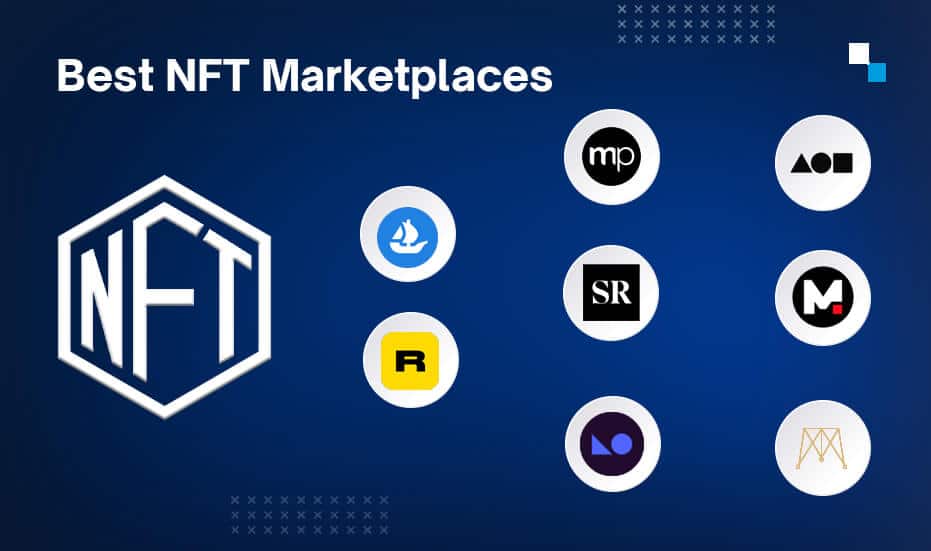
- OpenSea
- Rarible
- MakersPlace
- SuperRare
- KnownOrigin
- Foundation
- Mintable
- Portion
Cost to Build NFT Marketplace
The overall cost of developing an NFT marketplace depends on numerous factors besides the experience of the NFT marketplace development company you pick. Let’s take a look at the primary parameters that impact the cost of an NFT marketplace:
- Type of blockchain picked (Explore the most popular blockchains in this blog)
- KYC
- Payment gateways
- Mystery box
- Royalty
- Referrals
- ACL (deciding the admin & sub-admin roles)
- Analytics & reporting
- Feature listing
- Auction and buy
- Create listing
- Search functionality
- Storefront
- Wallet
- Notifications
- Ratings & reviews
There are numerous other factors deciding the NFT marketplace development costs:
- Platform complexity
- Third-party API integration
- NFT tech stack
- NFT marketplace niche
- Team size
- Development process
- Maintenance cost
- Type of solution- white label or fully customized one built from scratch.
Future of NFT Marketplace Development
Creating or sponsoring NFTs can be a unique way for businesses to showcase their brand and products to a new and engaged audience. For example, a sports team might create an NFT collection featuring memorable moments from their games, or a fashion brand might create an NFT line featuring limited edition designs.
All in all, the future of NFT marketplaces is bright and holds great potential for growth and innovation. We can expect increased adoption across a wider range of industries, integration with other emerging technologies, and new and innovative marketplace models while investing in best-in-class NFT marketplace development services.
Pro Tip to Hire the #1 NFT Marketplace Development Company
Prior to looking for an NFT marketplace company, it’s important to invest a great deal of time in understanding the overall industrial experience, the level of expertise, and the skill set of the developers besides their qualifications and certifications.
Don’t forget to go through the company portfolio and testimonials that will give a clear understanding of the type of projects delivered by the company apart from the budget and timeframe. Additionally, don’t hurry while making the decision, connect with various companies, ask for demos, and finalize the best NFT marketplace development company that perfectly suits your business needs and expectations.
No matter if you are a startup or an established agency, Antier can offer you a free consultation to strengthen your NFT journey and take your business to the zenith. As an award-winning NFT marketplace development company with a global presence, our certified and professional NFT marketplace developers can help you gain a competitive edge in the global market.
